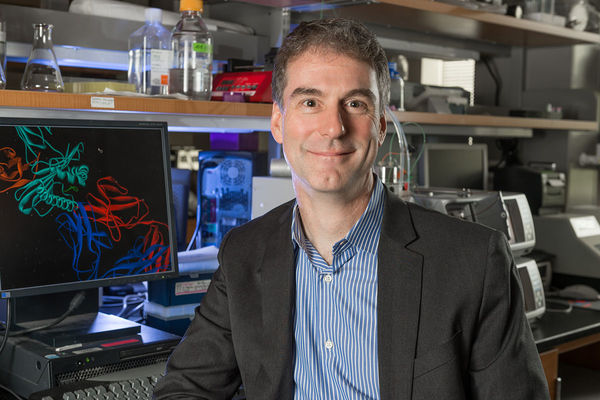Immunologists are changing how we look at cancer by studying how our immune system plays a role in treating cancer.

Brian Baker, Ph.D., and his lab in the Harper Cancer Research Institute and Department of Chemistry and Biochemistry were recently awarded a $4 million, 5-year grant from the National Institutes of Health (NIH) to study how they can best engineer a patient’s own T cells in their immune system to target the patient’s specific cancer.
Over the last decades, immunologists have been gaining greater understanding of the relationship between cancer and the immune system—more specifically, how the immune system defends against cancer. For example, immunologists know that patients with weakened immune systems (recipients of organ transplants, HIV patients, etc.) have greater occurrences of cancer. The question “How does cancer escape the immune system, take hold, and progress?” has been studied for many years and has led to new approaches, including successful new drug therapies like the immunotherapy treatment former President Jimmy Carter received that has rendered his metastatic melanoma in remission. Understanding the relationship between the immune system and cancer has led to these new drug therapies, which “take the brakes off” the immune system to allow a more complete and effective anti-cancer immune response.
The next frontier of immunotherapy involves custom engineering immune treatments for each patient. According to Baker, “An important class of cells in the immune system are cytotoxic T cells—killer T cells—because they attack and kill viruses, pathogens, and even tumors. What we are working toward is engineering those T cells to target a specific cancer with great efficiency and potency.”
Projecting 20 to 15, or just 10 years into the future, Baker believes cancer patients will be receiving engineered immune systems with T cells that can precisely detect and target each patient’s specific cancer. “Our research is about learning how to make existing T cells even better,” he said. In future treatment scenarios, “a patient’s killer T cells would be engineered to target their tumor.”
Early forms of this type of treatment have seen success in clinical trials, but there have also been failures as well, for example, engineered killer T cells recognizing healthy tissue as a target and destroying it. “We want to make the treatment better, to only target tumors. We want patients to see better outcomes. Our goal is to achieve efficacy and specificity—to engineer the immune system to more potently, and—importantly—more specifically recognize tumor cells,” said Baker.
Baker’s team is taking an interdisciplinary approach to their work, collaborating with scientists and researchers working in biophysics, immunology, and structural biology to better understand the immune system’s response to cancer and how they might harness it to create more effective, specialized treatments to improve patient outcomes. The project includes collaborators with medical schools at Loyola and Emory Universities. “This is really precision medicine or personalized medicine—in some ways the ultimate personalized medicine—to generate genetically engineered immune systems specific to each patient. It has enormous potential,” Baker shared.
Originally published by at science.nd.edu on January 03, 2017.
